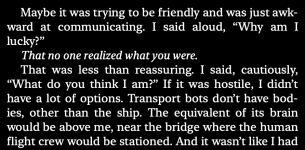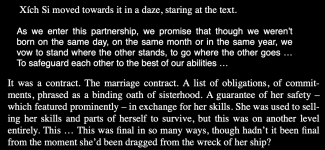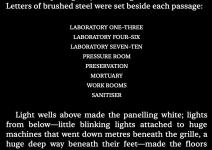- Joined
- Dec 4, 2017
- Posts
- 7,911
Okaaaay, well into the writing the Great Erotic Novel and have a question for those, if not Older, then at least Wiser than myself. (Objectively, that's not all that hard - just work with me.)
It's post-singularity and there are two main characters, one a young woman and the other the world computer, oh, call it 'Unicomp'. Computer voices in movies have always been just slightly out of step with human voices. Be it the shrill "Stair-Il-Ize!" of a rogue Star Trek satellite to the inhumanly human measured tones of the bearded Programmer in The Matrix, good ones have always been a bit distinctive. So, is there a way to express this in writing, here?
The obvious answer is to use my superlative writing skills, otherwise sticking to the Chicago Manual of Style. Yes, yes, got it. But aside from that?
Putting Unicomp's words all in caps would be superdistinctive, but also distracting, as would all italics or - ick! - all in bold. Small caps might work but that's not on the approved list.
Any other ideas? Thanks in advance.
It's post-singularity and there are two main characters, one a young woman and the other the world computer, oh, call it 'Unicomp'. Computer voices in movies have always been just slightly out of step with human voices. Be it the shrill "Stair-Il-Ize!" of a rogue Star Trek satellite to the inhumanly human measured tones of the bearded Programmer in The Matrix, good ones have always been a bit distinctive. So, is there a way to express this in writing, here?
The obvious answer is to use my superlative writing skills, otherwise sticking to the Chicago Manual of Style. Yes, yes, got it. But aside from that?
Putting Unicomp's words all in caps would be superdistinctive, but also distracting, as would all italics or - ick! - all in bold. Small caps might work but that's not on the approved list.
Any other ideas? Thanks in advance.



